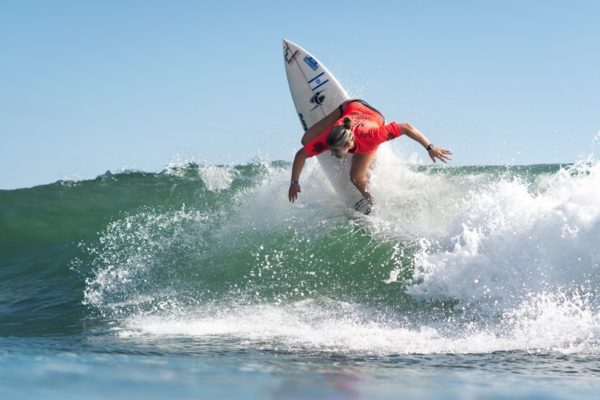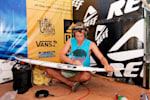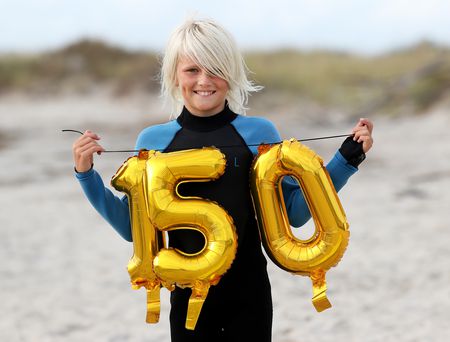Anat Lelior is a 19-year-old surfer from Tel Aviv, Israel who is now in her second year on the ‘QS. Last year during the 2019 ISA World Surfing Games in Miyazaki, Japan, Lelior surfed her way to a seat (well, a provisional seat) at the 2020 Olympic Games on behalf of Israel. Unless two of her female compatriots outperform her at the 2020 ISA World Surfing Games, Lelior will be repping Israel in Tokyo later this year.
Like the rest of the names provisionally qualified to compete in Tokyo, Lelior has a busy year ahead of her in the way of training for the upcoming event. But her day-to-day agenda will also be filled with another sort of responsibility which involves, believe it or not, serving as a soldier in the Israel Defense Forces.
In Israel, military service is mandatory for all citizens once they turn 18–even for those whose career paths involve surfing professionally on the world’s biggest stage. Luckily for Lelior, the Israel Defense Forces allow her to travel around the world for ‘QS events and spend time training for the upcoming Olympics.
We caught up with Lelior a few weeks ago while she was on the North Shore training with her coach Kahea Hart to find out more about her path to the Olympics, what it’s like serving her country and how she feels about getting the chance to surf against the likes of Steph Gilmore and Carissa Moore in roughly 7 months time.
Congratulations on qualifying for the Summer Games!
Thanks for the kind words. I never thought I would be in the Olympics. I guess it crossed my mind a month before the contest in Japan [the ISA World Games] that it was actually possible, but I never really believed I could get there next to world champs and my idols.
When did you start surfing?
I started when I was 5. My parents are not surfers, but we live a 5-minute walk away from Dolfinarium Beach. I was always watching surfers and was always drawn to the ocean, so I asked my dad to teach me. My first wave was a disaster. Somehow I cut my head open with the nose of the board and then I needed to go to the hospital to get stitches. [I don’t remember], but my parents told me all I wanted to do was to go back and try again.
What’s the surf scene like in Tel Aviv?
The surf in Tel Aviv is not so consistent, and when there are waves, the crowd is big. The surf itself can get good in the winter but it’s nothing like a swell from the ocean. The surf usually comes from short-period windswells. When there are waves, there are about two to three breaks that work and there are about 5,000 surfers in Tel Aviv, so you can imagine how crowded it gets. As a kid, I didn’t have a driver’s license and couldn’t get out of Tel Aviv, where it can be much less crowded.
Have you always loved competing?
When I was 12, I won my first Israeli title. That’s when I realized that I love the rush you get in a heat or when you beat somebody that was better in the free surf. I fell in love with winning.
Did you feel like you needed to travel the world a bit to gain experience in waves of higher consequence?
I definitely felt like I needed to travel to gain experience in waves of consequence, but also to improve my surfing and get used to doing more than one turn on a wave. But don’t get me wrong: Israel does reflect most of the ‘QS conditions. Other than that, I needed to travel not only for the waves but for the competitive environment that I didn’t get [in Israel].
What are you planning on doing between now and the Olympics? How are you preparing?
I’m not going to change a lot. I’m planning on doing the ‘QS and spending as much time in the water as I can. I will report for duty every time I’m in Israel. Unfortunately, I barely have time off, but with what I’ve got I’m going to spend it with family and friends.
Speaking of which, talk to me a bit about how you’re able to compete professionally while serving your country.
In Israel, military service is mandatory for all men and women when they get out of high school at around 18 years of age. Men need to serve 3 years and women need to serve 2 years. Of course, not all the positions are special forces and require going out to protect the country as everyone might imagine. There are a lot of positions in which you don’t necessarily risk your life, such as doing paperwork, being a cook, working in technology and more. Other than that, if you are a musician, a dancer, an athlete or something else like that, you can get into a program so that you can serve your country and do your profession while in the military. I got into the athlete program that allows me to do the ‘QS and the Olympics. It’s not easy, but I think that being an Israeli, you need to fulfill your commitments in some way and I found mine. Representing Israel on the ‘QS and in the Olympics is doing my service.
Do you report for duty every time you’re back in Israel? If so, what’s that like?
I do report for duty every time I get back home. It’s not that bad. I can’t exactly explain what I do, but I am serving as a professional athlete in the military and I’ve been serving since April. Sometimes it can be a slap to the face and sometimes it just feels like a part of my normal routine when I’m back home. The requirement is 30 hours weekly, but because of my situation, they are being flexible and allowing me to go whenever I need to train. Still, my schedule is packed most of the time.
Do they pay for you to travel, train and compete?
I’m happy to get some support from the government, but it’s definitely not enough [to cover everything]. My family helps out and I have sponsors that support me: a local surf shop and board shaper, Intersurf Surfboards, an investment company, Altshuler Shaham, and my official coach, Daniel Sigura.
I know it’s still over a year out, but what do you plan (and hope) to do at the end of your service?
I think after my service I’m gonna try to get to Bali and all over Indo. I can’t really get there with my Israeli passport but I will get there one day.
Do you ever run into issues traveling around the world with your Israeli passport?
I can get to Bali with a special visa, but it’s very expensive and very hard to get. There’s no diplomatic relationship between Indonesia and Israel, and that’s why with an Israeli passport you can’t get into Indonesia. As a surfer looking at videos of perfect waves with not many people surfing them, it is frustrating. And not being able to compete over there is annoying. Of course, there are many places I can visit and score heavier waves but Indo is definitely a dream for me.
What do you think about the 2024 event possibly being held at Teahupo’o?
I’m super excited to hear the event might be at Teahupo’o. Never been there, but I’ve been day-dreaming of going there. Not sure of how comfortable I am surfing there but I think I can manage it if it’s not as big as what it was this year during the trials for the ‘CT event. But practice makes perfect.
How do you feel about representing Israel on the world’s biggest athletic stage?
It feels surreal. I still am kinda shocked that I will be surfing next to Carissa, Stephanie and all the top surfers in the world. Before me, there was a man named Adi Gluska who competed in the European WQS, and Maya Dauber, who was sponsored by Roxy and was published in international surfing magazines. Nowadays there are many young talented surfers from Israel [who will soon show] what we are made of.
This interview has been edited and condensed for clarity.






Recent Comments